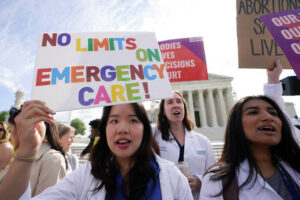Trump tells farmers ‘changes are coming’ to immigration crackdown
WASHINGTON — President Donald Trump acknowledged on Thursday that his immigration policies are hurting the farming and hotel industries, making a rare concession that his crackdown is having ripple effects on the American workforce.
Trump, who has made mass deportation a centerpiece of his presidency, said on social media that “changes are coming.” And while there was no sign of any significant modification to his policies, Trump’s statements suggested the scale of his crackdown may be alienating industries he wants to keep in his corner.
ADVERTISING
“Our great Farmers and people in the Hotel and Leisure business have been stating that our very aggressive policy on immigration is taking very good, long time workers away from them, with those jobs being almost impossible to replace,” he said. Trump for decades has owned luxury hotels, an industry with a strong immigrant labor force.
Trump then blamed the Biden administration for allowing “criminals” to apply for jobs on farms. “We must protect our Farmers, but get the CRIMINALS OUT OF THE USA.”
Later, at a news conference, he took an uncharacteristically sympathetic tone toward immigrants who work on farms and in the hospitality industry.
“Our farmers are being hurt badly by, you know, they have very good workers, they have worked for them for 20 years,” he said. “They’re not citizens, but they’ve turned out to be, you know, great. And we’re going to have to do something about that. We can’t take farmers and take all their people and send them back because they don’t have maybe what they’re supposed to have, maybe not.”
He later said that there would be an “order” soon on the matter.
“We can’t do that to our farmers and leisure, too, hotels,” he said. “We’re going to have to use a lot of common sense on that.”
The comments came as the Trump administration was accelerating its crackdown on immigration with a focus on workplaces with immigrant labor, such as farms, restaurants and construction sites. Last Friday, immigration raids in Los Angeles’ garment district set off protests that have spread to cities across the country.
Brian Kovak, an economics and public policy professor at Carnegie Mellon University in Pittsburgh, wrote in an email in April that deporting large groups of immigrants would cause a shock to major industries.
“It takes time and resources to recruit workers from other locations or occupations, and firms may need to raise wages and benefits to attract them, which will likely lead to higher prices for US consumers,” he wrote. “President Trump’s statements suggest that he is aware of this likely disruption and hopes to mitigate it.”
Trump made similar comments about farmers during a Cabinet meeting in April.
“If they have strong recommendations for their farms, for certain people, we’re going to let them stay in for a while,” he said at the time. “Work with the farmers, and then come back and go through a process, a legal process, but we have to take care of our farmers.”
In the past, she said, “the federal government has heeded the requests of growers and other employers to exempt their workers from restrictive immigration policies,” including a program in the 1940s that allowed Mexican farmworkers to enter the United States for more than two decades.
Trump’s softer tone did not last long. By Thursday afternoon, he was back to celebrating his immigration crackdown.
© 2025 The New York Times Company





